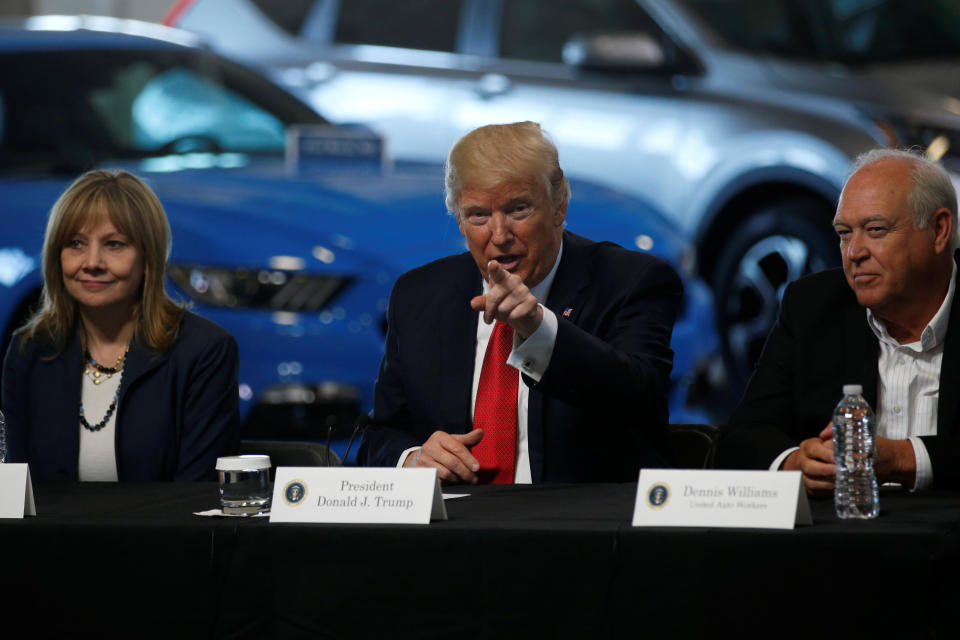Economist: Trump's tariffs, policies 'are looking more like a socialist state'
President Donald Trump’s tariffs on imports from China— and potentially Mexico — are making his “America First policies” look “more like a planned socialist state,” one Wall Street economist said on Thursday.
The president is poised to slap across the board tariffs on Mexico of 5%, due to the country’s failure to rein in a surge of migrants storming the border. Despite bipartisan opposition and high-level talks between both countries, the plan could take effect as early as next week.
The broadside at Mexico comes as markets are in turmoil over the Trump administration’s trade agenda. The fight between the U.S. and China has no end in sight, and is emerging as a real threat to worldwide growth.
“Tariffs are already having a deleterious effect on trade flows even before they grow to much higher levels that could virtually destroy world trade between nations,” MUFG Union Bank Chief Financial Economist Bank Chris Rupkey wrote in a note.
And as “trade in and out of the US is slowly grinding to a halt… Tariff man could bring down the entire world economy all to bring back America to the days when it made all its own automobiles,” he added.
Blasting Trump’s “America First” mantra, Rupkey said the president’s policies “are looking more like a planned socialist state where governments tell corporations what they can and cannot do. Doesn't sound like capitalism.”
‘Economic war’

During his inauguration address, Trump promised the American people: “From this day forward, a new vision will govern our land. From this moment on, it’s going to be America First,” the former real estate tycoon said in January 2017.
“Every decision on trade, on taxes, on immigration, on foreign affairs, will be made to benefit American workers and American families…. America will start winning again, winning like never before,” Trump added.
Under his administration, the U.S. government first imposed tariffs on China in March last year, which is considered to be the opening salvo for the trade war that’s underway today.
Both sides have engaged in an aggressive tit-for-tat strategy, with Trump and China showing no signs of backing down. China also recently vowed to “fight til the end.”
However, Rupkey argued that “this isn't a trade war with China. It is an economic war with US corporations that moved factories overseas that the Trump trade negotiators are waging.”
The economist added: “At this point, it is too late to bring factories back here. There is no one home in America to make automobiles anymore with the labor market at full employment and everyone already has a job.”
‘Worst is still to come’
U.S. companies feeling the pain have registered their disappointment as they expect a massive increase in cost from the two tariffs.
Farmers, meanwhile, are feeling “pretty helpless” from being cut off from crucial markets for their agricultural products like soybeans.
Separately, U.S. exports to China are falling quickly, Rupkey pointed out, down nearly 21% in the first four months of 2019. Imports are down nearly 13%.
The environment is making it hard for businesses and the agriculture sector, which are facing supply chain concerns and uncertainty as they plan for the future.
While the trade war is costing both China and the U.S., data suggests the latter is undermining America’s resurgent manufacturing sector — a key Trump constituency.
“America is not winning in percentage terms,” Rupkey stated. “Taking in $125 million in customs duties on $500 billion of China imports is not going to cushion the blow to US manufacturers who have seen an $8.9 billion drop in what they sell to China so far this year. No exports no jobs, jobs, jobs.”
Rupkey warned ominously that markets should “stay tuned. … The worst is still to come. You haven't seen nothing yet.”
—
Aarthi is a writer for Yahoo Finance. Follow her on Twitter @aarthiswami.
Read more:
Here's how much new Trump tariffs could cost American households
National Retail Federation: New Trump tariffs are 'too great a gamble'
Follow Yahoo Finance on Twitter, Facebook, Instagram, Flipboard, SmartNews, LinkedIn, YouTube, and reddit.
